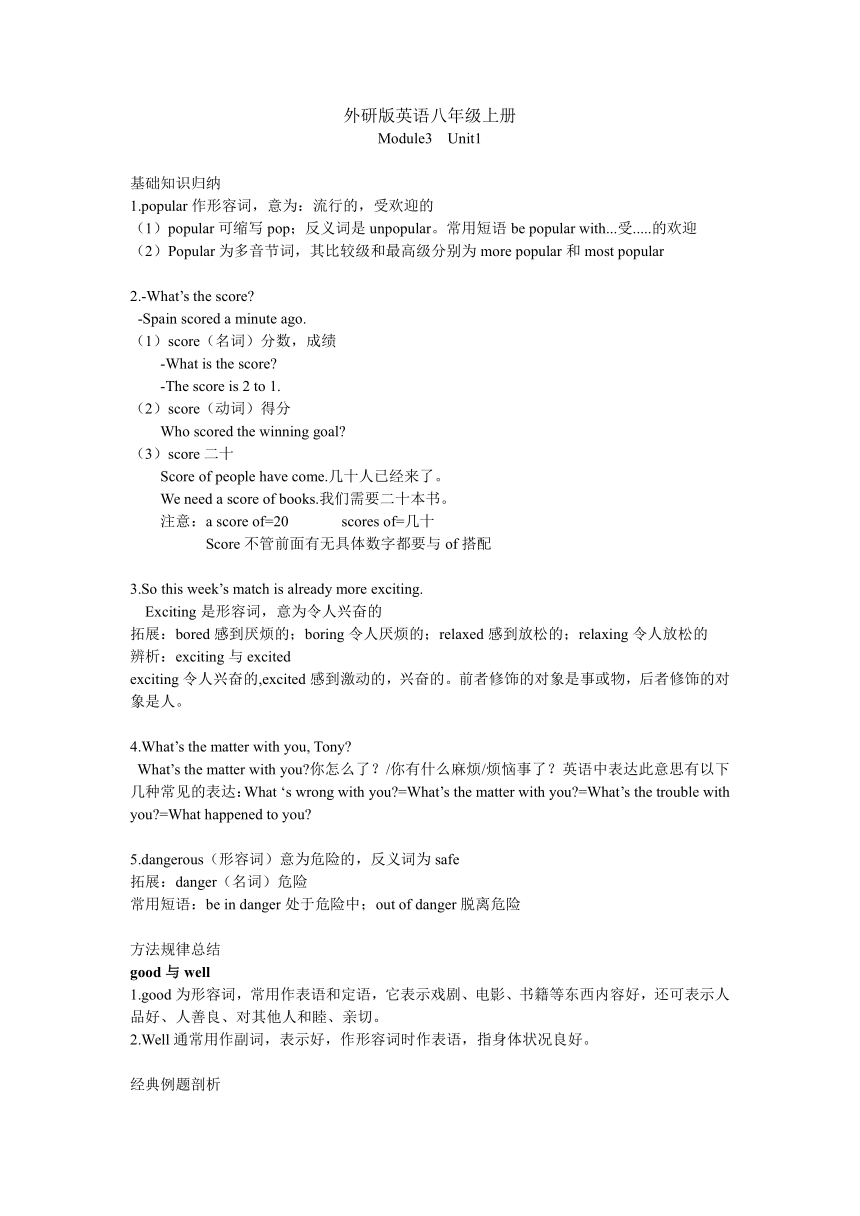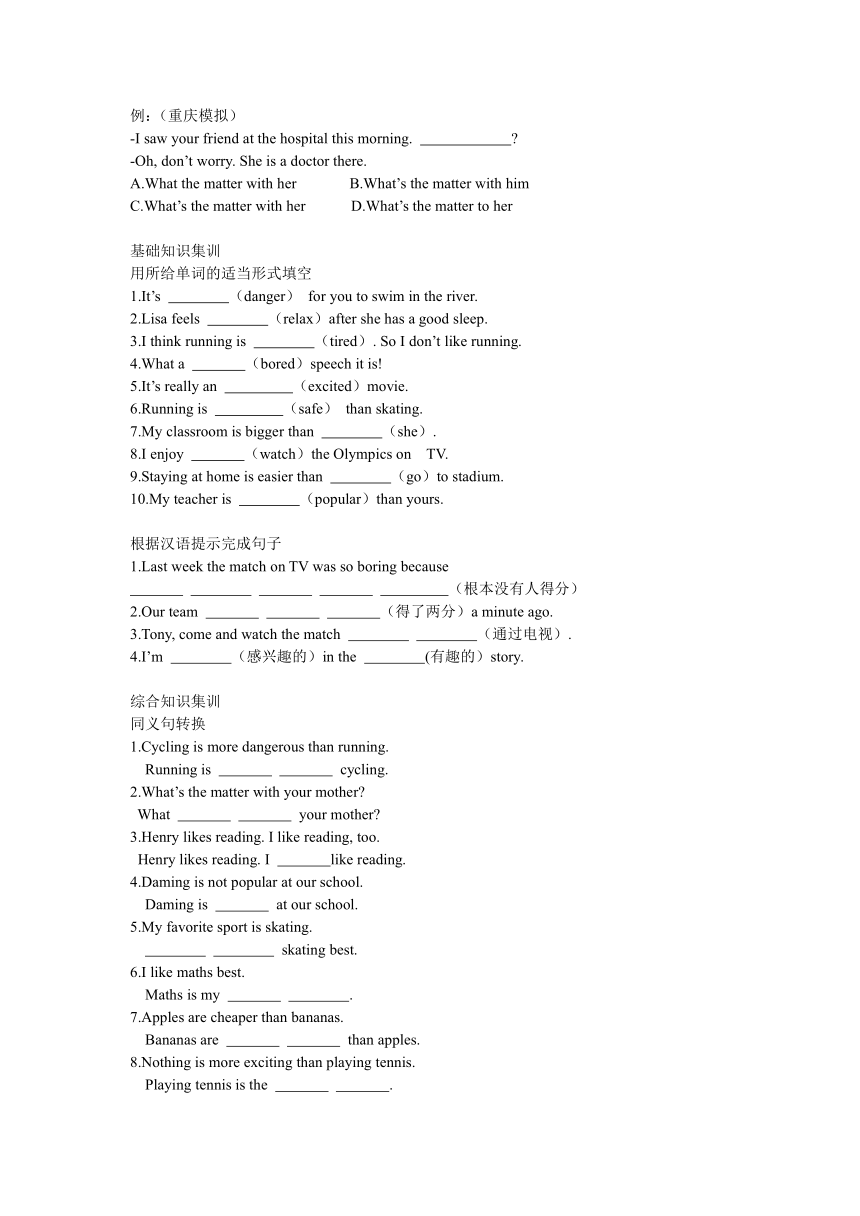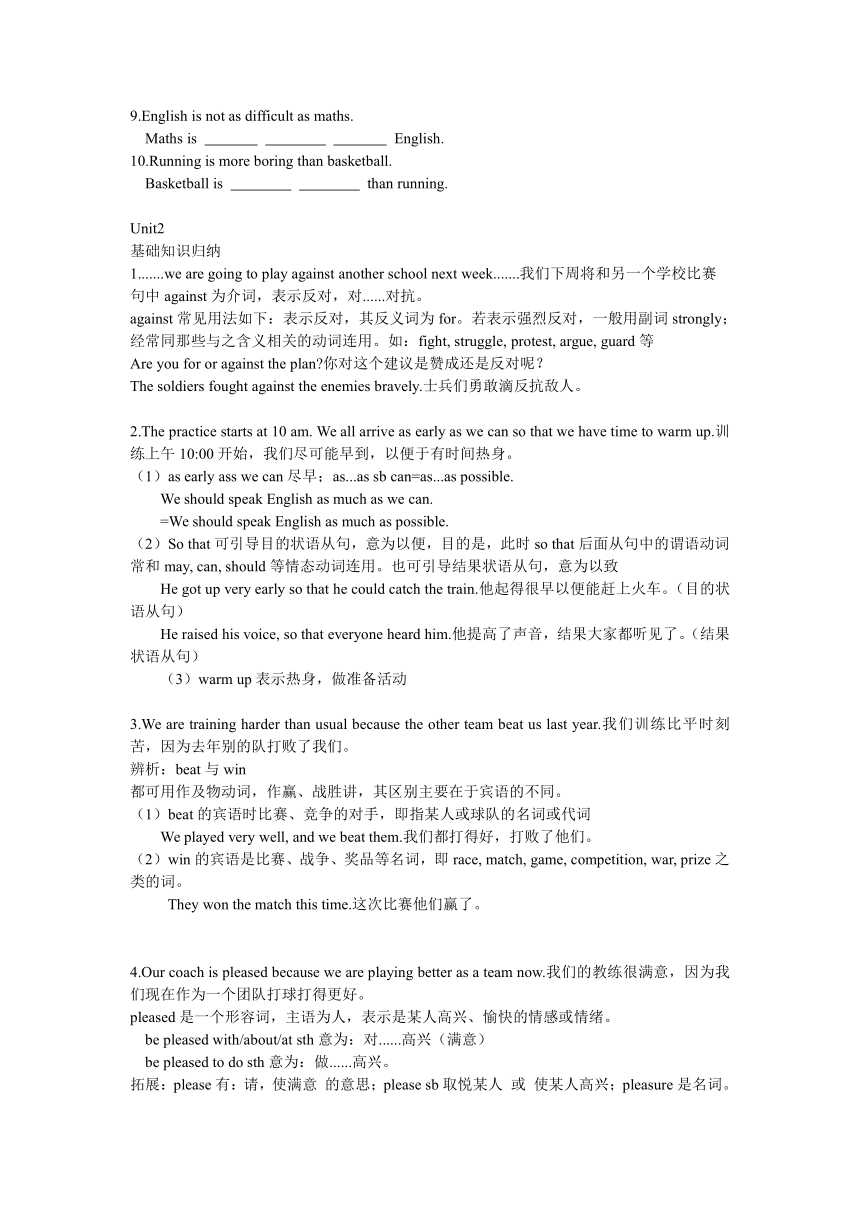外研版英语八年级上册 Module 3 Sports.导学案 练习题(无答案)
文档属性
| 名称 | 外研版英语八年级上册 Module 3 Sports.导学案 练习题(无答案) |  | |
| 格式 | zip | ||
| 文件大小 | 37.0KB | ||
| 资源类型 | 教案 | ||
| 版本资源 | 外研版 | ||
| 科目 | 英语 | ||
| 更新时间 | 2020-09-28 07:11:25 | ||
图片预览



文档简介
外研版英语八年级上册
Module3
Unit1
基础知识归纳
1.popular作形容词,意为:流行的,受欢迎的
(1)popular可缩写pop;反义词是unpopular。常用短语be
popular
with...受.....的欢迎
(2)Popular为多音节词,其比较级和最高级分别为more
popular和most
popular
2.-What’s
the
score?
-Spain
scored
a
minute
ago.
(1)score(名词)分数,成绩
-What
is
the
score?
-The
score
is
2
to
1.
(2)score(动词)得分
Who
scored
the
winning
goal?
(3)score二十
Score
of
people
have
come.几十人已经来了。
We
need
a
score
of
books.我们需要二十本书。
注意:a
score
of=20
scores
of=几十
Score不管前面有无具体数字都要与of搭配
3.So
this
week’s
match
is
already
more
exciting.
Exciting是形容词,意为令人兴奋的
拓展:bored感到厌烦的;boring令人厌烦的;relaxed感到放松的;relaxing令人放松的
辨析:exciting与excited
exciting令人兴奋的,excited感到激动的,兴奋的。前者修饰的对象是事或物,后者修饰的对象是人。
4.What’s
the
matter
with
you,
Tony?
What’s
the
matter
with
you?你怎么了?/你有什么麻烦/烦恼事了?英语中表达此意思有以下几种常见的表达:What
‘s
wrong
with
you?=What’s
the
matter
with
you?=What’s
the
trouble
with
you?=What
happened
to
you?
5.dangerous(形容词)意为危险的,反义词为safe
拓展:danger(名词)危险
常用短语:be
in
danger处于危险中;out
of
danger脱离危险
方法规律总结
good与well
1.good为形容词,常用作表语和定语,它表示戏剧、电影、书籍等东西内容好,还可表示人品好、人善良、对其他人和睦、亲切。
2.Well通常用作副词,表示好,作形容词时作表语,指身体状况良好。
经典例题剖析
例:(重庆模拟)
-I
saw
your
friend
at
the
hospital
this
morning.
?
-Oh,
don’t
worry.
She
is
a
doctor
there.
A.What
the
matter
with
her
B.What’s
the
matter
with
him
C.What’s
the
matter
with
her
D.What’s
the
matter
to
her
基础知识集训
用所给单词的适当形式填空
1.It’s
(danger)
for
you
to
swim
in
the
river.
2.Lisa
feels
(relax)after
she
has
a
good
sleep.
3.I
think
running
is
(tired).
So
I
don’t
like
running.
4.What
a
(bored)speech
it
is!
5.It’s
really
an
(excited)movie.
6.Running
is
(safe)
than
skating.
7.My
classroom
is
bigger
than
(she).
8.I
enjoy
(watch)the
Olympics
on
TV.
9.Staying
at
home
is
easier
than
(go)to
stadium.
10.My
teacher
is
(popular)than
yours.
根据汉语提示完成句子
1.Last
week
the
match
on
TV
was
so
boring
because
(根本没有人得分)
2.Our
team
(得了两分)a
minute
ago.
3.Tony,
come
and
watch
the
match
(通过电视).
4.I’m
(感兴趣的)in
the
(有趣的)story.
综合知识集训
同义句转换
1.Cycling
is
more
dangerous
than
running.
Running
is
cycling.
2.What’s
the
matter
with
your
mother?
What
your
mother?
3.Henry
likes
reading.
I
like
reading,
too.
Henry
likes
reading.
I
like
reading.
4.Daming
is
not
popular
at
our
school.
Daming
is
at
our
school.
5.My
favorite
sport
is
skating.
skating
best.
6.I
like
maths
best.
Maths
is
my
.
7.Apples
are
cheaper
than
bananas.
Bananas
are
than
apples.
8.Nothing
is
more
exciting
than
playing
tennis.
Playing
tennis
is
the
.
9.English
is
not
as
difficult
as
maths.
Maths
is
English.
10.Running
is
more
boring
than
basketball.
Basketball
is
than
running.
Unit2
基础知识归纳
1.......we
are
going
to
play
against
another
school
next
week.......我们下周将和另一个学校比赛
句中against为介词,表示反对,对......对抗。
against常见用法如下:表示反对,其反义词为for。若表示强烈反对,一般用副词strongly;经常同那些与之含义相关的动词连用。如:fight,
struggle,
protest,
argue,
guard等
Are
you
for
or
against
the
plan?你对这个建议是赞成还是反对呢?
The
soldiers
fought
against
the
enemies
bravely.士兵们勇敢滴反抗敌人。
2.The
practice
starts
at
10
am.
We
all
arrive
as
early
as
we
can
so
that
we
have
time
to
warm
up.训练上午10:00开始,我们尽可能早到,以便于有时间热身。
(1)as
early
ass
we
can尽早;as...as
sb
can=as...as
possible.
We
should
speak
English
as
much
as
we
can.
=We
should
speak
English
as
much
as
possible.
(2)So
that可引导目的状语从句,意为以便,目的是,此时so
that后面从句中的谓语动词常和may,
can,
should等情态动词连用。也可引导结果状语从句,意为以致
He
got
up
very
early
so
that
he
could
catch
the
train.他起得很早以便能赶上火车。(目的状语从句)
He
raised
his
voice,
so
that
everyone
heard
him.他提高了声音,结果大家都听见了。(结果状语从句)
(3)warm
up表示热身,做准备活动
3.We
are
training
harder
than
usual
because
the
other
team
beat
us
last
year.我们训练比平时刻苦,因为去年别的队打败了我们。
辨析:beat与win
都可用作及物动词,作赢、战胜讲,其区别主要在于宾语的不同。
(1)beat的宾语时比赛、竞争的对手,即指某人或球队的名词或代词
We
played
very
well,
and
we
beat
them.我们都打得好,打败了他们。
(2)win的宾语是比赛、战争、奖品等名词,即race,
match,
game,
competition,
war,
prize之类的词。
They
won
the
match
this
time.这次比赛他们赢了。
4.Our
coach
is
pleased
because
we
are
playing
better
as
a
team
now.我们的教练很满意,因为我们现在作为一个团队打球打得更好。
pleased是一个形容词,主语为人,表示是某人高兴、愉快的情感或情绪。
be
pleased
with/about/at
sth意为:对......高兴(满意)
be
pleased
to
do
sth意为:做......高兴。
拓展:please有:请,使满意
的意思;please
sb取悦某人
或
使某人高兴;pleasure是名词。
5.That
means
we
have
a
better
chance
of
winning.那意味着我们有更好的获胜的机会。
have
a
chance
of
doing
sth
=have
a
chance
to
do
sth
=have
an
opportunity
to
do
sth
有机会做某事
I
have
a
chance
to
go
to
Beijing.
=I
have
a
chance
of
going
to
Beijing.
我有去北京的机会。
6.It’s
good
to
have
our
fans
around.有我们的粉丝在我们周围真是太好了。
本句构成:It’s+形容词+(for
sb)+to
do
sth
意思是(对某人来说)做某事是......的。其中it为形式主语,后面的动词不定式为真正的主语。
It’s
very
easy
for
me
to
do
that.做那件事对我来说很容易。
方法规律总结
need的用法歌诀
实意动词表需要,后跟名、代、不定式。
need后跟动词-ing,主动形式表被动。
情态动词表需要,没有人称、时态、数
其后直接跟动词,常用疑问与否定。
经典例题剖析
例1.We
the
strongest
team
in
the
football
match,
so
we
the
first
prize
this
time.
A.win;
beat
B.won;
beat
C.beat;won
D.beat;
win
解析:打败某人或某个团队用beat;获奖用win;句子的时态为一般过去时。故答案为C。
例2.I
like
English
very
much.
I
never
miss
any
to
practise
English
with
foreigners.
A.subject
B.mistake
C.chance
D.space
解析:本题考查名词辨析。subject主题;mistake错误;chance机会;space空间。句中提到和外国人练习英语的机会,故选C。
基础知识集训
写出下列的比较级
young
far
early
late
much
popular
little
exciting
happy
boring
根据句意及首字母提示写单词
1.It’s
more
difficult
to
p
playing
basketball
in
winter
because
it’s
cold.
2.I
can’t
hear
you
clearly.
Can
you
speak
l
?
3.The
o
man
is
eighty
years
old,
but
he
is
still
healthy.
4.I
have
to
study
h
,
or
I
won’t
pass
the
exam.
5.I
get
to
school
early
as
u
.
6.We
often
l
to
other
teams,
but
this
time
we
decide
to
beat
them.
根据汉语提示补全句子
1.Look!
They
are
(正在上英语课).
2.We
hope
to
play
well
(为了)we
have
more
fans
to
watch
the
match.
3.It’s
good
to
have
our
fans
around
because
(他们大声为我们加油).
4.She
speaks
English
(比较好).
5.My
father
(对......感到满意)the
results
of
my
English
test.
6.I
have
two
brothers.
One
is
playing
football,
and
(另一个是打篮球).
Unit3
基础知识归纳
1.My
favorite
sport
is...我最喜欢的体育项目是......
favourite既可作形容词,意为最喜爱的;又可作名词,意为最喜欢的人或物。前面常与形容词性物主代词连用,与like...best同义。
My
favourite
sport
is
football.
=I
like
football
best.
2.In
the
mornings
and
evenings
you
can
see
people
jogging
in
parks
or
along
city
streets.
在早上和晚上你会看到人们在公园里或沿着城市的街道慢跑。
see
people
jogging看到人们慢跑。
see
sb
doing
sth看见某人正在做某事
see
sb
do
sth看见某人干了或经常干某事
I
see
her
cleaning
the
classroom.我看见她正在打扫教室。(强调正在做某事)
I
see
him
come
in
and
sit
down.我看见他走进来并且坐下。(强调动作的全过程)
3.The
more
you
go
jogging,
the
longer
you
will
run
and
you
the
healthier
you
will
feel.你慢跑得越远,并且你将感到越健康
。
the
more...the
longer...the
healthier...是英语中的:the+比较级,the+比较级
表示:越......越......
The
more
we
do
for
the
people,
the
happier
we’ll
be.我们为人民做得越多,我们就越幸福。
方法规律总结
比较级使用三留意
1.留意比较级的对象是否一致。
2.留意比较的对象是否在同一范围内
3.留意比较级的相互转换
经典例题剖析
例1.-You
speak
English
much
than
before.
-Thank
you.
A.well
B.better
C.best
D.good
解析:由than可知此句应用比较级,故选B
例2.My
shoes
are
cheaper
than
.
A.you
B.your
C.yours
D.your
ones
解析:yours为名词性物主代词,相当于your
shoes,与主语形成比较。选A是代词,指人,与主语不具有可比性。选项B是形容词性物主代词,不具有名词的性质,不能与主语比较。选项D中是替代词,替代词前面不能直接用物主代词修饰,不能说your
ones或my
ones。此空应直接用名词性物主代词。
基础知识集训
英汉互译
1.table
tennis
2.decide
to
do
sth
3.get
lost
4.join
the
swimming
club
5.enjoy
jogging
6.参加
7.开始
8.不久以后
9.保持健康
10.去慢跑
根据汉语提示写单词
1.Please
keep
(安静).The
baby
is
sleeping.
2.Can
you
(传递)me
the
book?
3.I
was
so
(粗心)that
I
made
some
mistakes
in
the
test.
4.When
we
got
lost
in
the
mountain,
I
(使受伤)my
left.
5.My
father
has
a
(机会)to
go
to
America
to
learn
English.
Module3
Unit1
基础知识归纳
1.popular作形容词,意为:流行的,受欢迎的
(1)popular可缩写pop;反义词是unpopular。常用短语be
popular
with...受.....的欢迎
(2)Popular为多音节词,其比较级和最高级分别为more
popular和most
popular
2.-What’s
the
score?
-Spain
scored
a
minute
ago.
(1)score(名词)分数,成绩
-What
is
the
score?
-The
score
is
2
to
1.
(2)score(动词)得分
Who
scored
the
winning
goal?
(3)score二十
Score
of
people
have
come.几十人已经来了。
We
need
a
score
of
books.我们需要二十本书。
注意:a
score
of=20
scores
of=几十
Score不管前面有无具体数字都要与of搭配
3.So
this
week’s
match
is
already
more
exciting.
Exciting是形容词,意为令人兴奋的
拓展:bored感到厌烦的;boring令人厌烦的;relaxed感到放松的;relaxing令人放松的
辨析:exciting与excited
exciting令人兴奋的,excited感到激动的,兴奋的。前者修饰的对象是事或物,后者修饰的对象是人。
4.What’s
the
matter
with
you,
Tony?
What’s
the
matter
with
you?你怎么了?/你有什么麻烦/烦恼事了?英语中表达此意思有以下几种常见的表达:What
‘s
wrong
with
you?=What’s
the
matter
with
you?=What’s
the
trouble
with
you?=What
happened
to
you?
5.dangerous(形容词)意为危险的,反义词为safe
拓展:danger(名词)危险
常用短语:be
in
danger处于危险中;out
of
danger脱离危险
方法规律总结
good与well
1.good为形容词,常用作表语和定语,它表示戏剧、电影、书籍等东西内容好,还可表示人品好、人善良、对其他人和睦、亲切。
2.Well通常用作副词,表示好,作形容词时作表语,指身体状况良好。
经典例题剖析
例:(重庆模拟)
-I
saw
your
friend
at
the
hospital
this
morning.
?
-Oh,
don’t
worry.
She
is
a
doctor
there.
A.What
the
matter
with
her
B.What’s
the
matter
with
him
C.What’s
the
matter
with
her
D.What’s
the
matter
to
her
基础知识集训
用所给单词的适当形式填空
1.It’s
(danger)
for
you
to
swim
in
the
river.
2.Lisa
feels
(relax)after
she
has
a
good
sleep.
3.I
think
running
is
(tired).
So
I
don’t
like
running.
4.What
a
(bored)speech
it
is!
5.It’s
really
an
(excited)movie.
6.Running
is
(safe)
than
skating.
7.My
classroom
is
bigger
than
(she).
8.I
enjoy
(watch)the
Olympics
on
TV.
9.Staying
at
home
is
easier
than
(go)to
stadium.
10.My
teacher
is
(popular)than
yours.
根据汉语提示完成句子
1.Last
week
the
match
on
TV
was
so
boring
because
(根本没有人得分)
2.Our
team
(得了两分)a
minute
ago.
3.Tony,
come
and
watch
the
match
(通过电视).
4.I’m
(感兴趣的)in
the
(有趣的)story.
综合知识集训
同义句转换
1.Cycling
is
more
dangerous
than
running.
Running
is
cycling.
2.What’s
the
matter
with
your
mother?
What
your
mother?
3.Henry
likes
reading.
I
like
reading,
too.
Henry
likes
reading.
I
like
reading.
4.Daming
is
not
popular
at
our
school.
Daming
is
at
our
school.
5.My
favorite
sport
is
skating.
skating
best.
6.I
like
maths
best.
Maths
is
my
.
7.Apples
are
cheaper
than
bananas.
Bananas
are
than
apples.
8.Nothing
is
more
exciting
than
playing
tennis.
Playing
tennis
is
the
.
9.English
is
not
as
difficult
as
maths.
Maths
is
English.
10.Running
is
more
boring
than
basketball.
Basketball
is
than
running.
Unit2
基础知识归纳
1.......we
are
going
to
play
against
another
school
next
week.......我们下周将和另一个学校比赛
句中against为介词,表示反对,对......对抗。
against常见用法如下:表示反对,其反义词为for。若表示强烈反对,一般用副词strongly;经常同那些与之含义相关的动词连用。如:fight,
struggle,
protest,
argue,
guard等
Are
you
for
or
against
the
plan?你对这个建议是赞成还是反对呢?
The
soldiers
fought
against
the
enemies
bravely.士兵们勇敢滴反抗敌人。
2.The
practice
starts
at
10
am.
We
all
arrive
as
early
as
we
can
so
that
we
have
time
to
warm
up.训练上午10:00开始,我们尽可能早到,以便于有时间热身。
(1)as
early
ass
we
can尽早;as...as
sb
can=as...as
possible.
We
should
speak
English
as
much
as
we
can.
=We
should
speak
English
as
much
as
possible.
(2)So
that可引导目的状语从句,意为以便,目的是,此时so
that后面从句中的谓语动词常和may,
can,
should等情态动词连用。也可引导结果状语从句,意为以致
He
got
up
very
early
so
that
he
could
catch
the
train.他起得很早以便能赶上火车。(目的状语从句)
He
raised
his
voice,
so
that
everyone
heard
him.他提高了声音,结果大家都听见了。(结果状语从句)
(3)warm
up表示热身,做准备活动
3.We
are
training
harder
than
usual
because
the
other
team
beat
us
last
year.我们训练比平时刻苦,因为去年别的队打败了我们。
辨析:beat与win
都可用作及物动词,作赢、战胜讲,其区别主要在于宾语的不同。
(1)beat的宾语时比赛、竞争的对手,即指某人或球队的名词或代词
We
played
very
well,
and
we
beat
them.我们都打得好,打败了他们。
(2)win的宾语是比赛、战争、奖品等名词,即race,
match,
game,
competition,
war,
prize之类的词。
They
won
the
match
this
time.这次比赛他们赢了。
4.Our
coach
is
pleased
because
we
are
playing
better
as
a
team
now.我们的教练很满意,因为我们现在作为一个团队打球打得更好。
pleased是一个形容词,主语为人,表示是某人高兴、愉快的情感或情绪。
be
pleased
with/about/at
sth意为:对......高兴(满意)
be
pleased
to
do
sth意为:做......高兴。
拓展:please有:请,使满意
的意思;please
sb取悦某人
或
使某人高兴;pleasure是名词。
5.That
means
we
have
a
better
chance
of
winning.那意味着我们有更好的获胜的机会。
have
a
chance
of
doing
sth
=have
a
chance
to
do
sth
=have
an
opportunity
to
do
sth
有机会做某事
I
have
a
chance
to
go
to
Beijing.
=I
have
a
chance
of
going
to
Beijing.
我有去北京的机会。
6.It’s
good
to
have
our
fans
around.有我们的粉丝在我们周围真是太好了。
本句构成:It’s+形容词+(for
sb)+to
do
sth
意思是(对某人来说)做某事是......的。其中it为形式主语,后面的动词不定式为真正的主语。
It’s
very
easy
for
me
to
do
that.做那件事对我来说很容易。
方法规律总结
need的用法歌诀
实意动词表需要,后跟名、代、不定式。
need后跟动词-ing,主动形式表被动。
情态动词表需要,没有人称、时态、数
其后直接跟动词,常用疑问与否定。
经典例题剖析
例1.We
the
strongest
team
in
the
football
match,
so
we
the
first
prize
this
time.
A.win;
beat
B.won;
beat
C.beat;won
D.beat;
win
解析:打败某人或某个团队用beat;获奖用win;句子的时态为一般过去时。故答案为C。
例2.I
like
English
very
much.
I
never
miss
any
to
practise
English
with
foreigners.
A.subject
B.mistake
C.chance
D.space
解析:本题考查名词辨析。subject主题;mistake错误;chance机会;space空间。句中提到和外国人练习英语的机会,故选C。
基础知识集训
写出下列的比较级
young
far
early
late
much
popular
little
exciting
happy
boring
根据句意及首字母提示写单词
1.It’s
more
difficult
to
p
playing
basketball
in
winter
because
it’s
cold.
2.I
can’t
hear
you
clearly.
Can
you
speak
l
?
3.The
o
man
is
eighty
years
old,
but
he
is
still
healthy.
4.I
have
to
study
h
,
or
I
won’t
pass
the
exam.
5.I
get
to
school
early
as
u
.
6.We
often
l
to
other
teams,
but
this
time
we
decide
to
beat
them.
根据汉语提示补全句子
1.Look!
They
are
(正在上英语课).
2.We
hope
to
play
well
(为了)we
have
more
fans
to
watch
the
match.
3.It’s
good
to
have
our
fans
around
because
(他们大声为我们加油).
4.She
speaks
English
(比较好).
5.My
father
(对......感到满意)the
results
of
my
English
test.
6.I
have
two
brothers.
One
is
playing
football,
and
(另一个是打篮球).
Unit3
基础知识归纳
1.My
favorite
sport
is...我最喜欢的体育项目是......
favourite既可作形容词,意为最喜爱的;又可作名词,意为最喜欢的人或物。前面常与形容词性物主代词连用,与like...best同义。
My
favourite
sport
is
football.
=I
like
football
best.
2.In
the
mornings
and
evenings
you
can
see
people
jogging
in
parks
or
along
city
streets.
在早上和晚上你会看到人们在公园里或沿着城市的街道慢跑。
see
people
jogging看到人们慢跑。
see
sb
doing
sth看见某人正在做某事
see
sb
do
sth看见某人干了或经常干某事
I
see
her
cleaning
the
classroom.我看见她正在打扫教室。(强调正在做某事)
I
see
him
come
in
and
sit
down.我看见他走进来并且坐下。(强调动作的全过程)
3.The
more
you
go
jogging,
the
longer
you
will
run
and
you
the
healthier
you
will
feel.你慢跑得越远,并且你将感到越健康
。
the
more...the
longer...the
healthier...是英语中的:the+比较级,the+比较级
表示:越......越......
The
more
we
do
for
the
people,
the
happier
we’ll
be.我们为人民做得越多,我们就越幸福。
方法规律总结
比较级使用三留意
1.留意比较级的对象是否一致。
2.留意比较的对象是否在同一范围内
3.留意比较级的相互转换
经典例题剖析
例1.-You
speak
English
much
than
before.
-Thank
you.
A.well
B.better
C.best
D.good
解析:由than可知此句应用比较级,故选B
例2.My
shoes
are
cheaper
than
.
A.you
B.your
C.yours
D.your
ones
解析:yours为名词性物主代词,相当于your
shoes,与主语形成比较。选A是代词,指人,与主语不具有可比性。选项B是形容词性物主代词,不具有名词的性质,不能与主语比较。选项D中是替代词,替代词前面不能直接用物主代词修饰,不能说your
ones或my
ones。此空应直接用名词性物主代词。
基础知识集训
英汉互译
1.table
tennis
2.decide
to
do
sth
3.get
lost
4.join
the
swimming
club
5.enjoy
jogging
6.参加
7.开始
8.不久以后
9.保持健康
10.去慢跑
根据汉语提示写单词
1.Please
keep
(安静).The
baby
is
sleeping.
2.Can
you
(传递)me
the
book?
3.I
was
so
(粗心)that
I
made
some
mistakes
in
the
test.
4.When
we
got
lost
in
the
mountain,
I
(使受伤)my
left.
5.My
father
has
a
(机会)to
go
to
America
to
learn
English.
同课章节目录
- Module 1 How to learn English
- Unit 1 Let's try to speak English as much as possi
- Unit 2 You should smile at her.
- Unit 3 Language in use .
- Module 2 My home town and my country
- Unit 1 It's taller than many other buildings.
- Unit 2 Cambridge is a beautiful city in the east o
- Unit 3 Language in use .
- Module 3 Sports.
- Unit 1 Nothing is more exciting than playing tenni
- Unit 2 This year we training more carefully.
- Unit 3 Language in use .
- Module 4 Planes, ships and trains .
- Unit 1 He lives the farthest from school.
- Unit 2 What is the best way to travel.
- Unit 3 Language in use .
- Module 5 Lao She Teahouse.
- Unit 1 I wanted to see the Beijing Opera.
- Unit 2 It descibes the changes in Chinese society.
- Unit 3 Language in use .
- Module 6 Animals in danger.
- Unit 1 It allows people to get closer to them .
- Unit 2 The WWF is working hard to save them all.
- Unit 3 Language in use .
- Revision module A
- Module 7 A famous story
- Unit 1 Alice was sitting with her sister by the ri
- Unit 2 She was thinking about her cat.
- Unit 3 Language in use .
- Module 8 Accidents
- Unit 1 While the car were changing to red, a car s
- Unit 2 I was trying to pick it up when it bite me
- Unit 3 Language in use .
- Module 9 Population
- Unit 1 The population of China is about 1.37 billi
- Unit 2 Arnwick was a city with 200,000 people.
- Unit 3 Language in use .
- Module 10 The weathe
- Unit 1 It might snow.
- Unit 2 The weather is fine all year round.
- Unit 3 Language in use .
- Module 11 Way of life
- Unit 1 In China ,we open a gift later.
- Unit 2 In England, you usually drink tea with milk
- Unit 3 Language in use .
- Module 12 Help
- Unit 1 What should we do before help arrives?
- Unit 2 Stay away from windows and heavy furniture.
- Unit 3 Language in use .
- Revision module B
